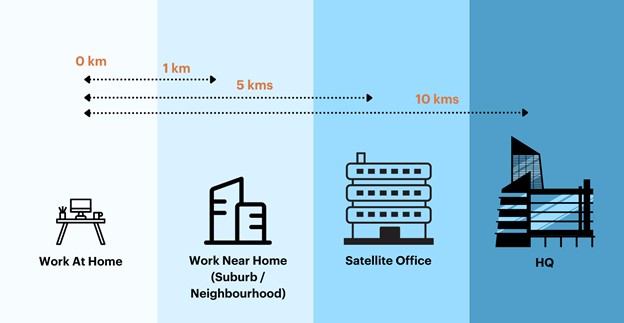Hybrid work
Prediction - Suburbs and satellite offices are the future
Shyam Sundar Nagarajan / Reading Time : 6 mins
IN THIS STORY
Between wave 1 and wave 2 of the pandemic we have all realised that life is too short to be spent in commutes. Life is too short to make too many compromises for our work and jobs. The pandemic epiphany is that we now want our work and office to fit into the life that we want to live. We no longer want to be slaves of our jobs. This big shift in thinking is going to have a huge impact on how workspaces are set up and designed.
Everyone has been predicting what the future of office would be. Some say it would be a clubhouse and many have talked about a hub-and-spoke model gaining prominence. One big prediction that we make is that the future is going to be in the suburbs and satellite offices. They would be the spokes of the hub-and-spoke model.
Let us break that down now.

What are satellite offices?
Loneliness, collaboration issues and team bonding have surfaced as the biggest problems that companies should solve. Those employees who have joined a company remotely during the pandemic have not been able to observe and absorb the culture of the organisation. The need of the hour is to have a solution that addresses the 2Cs of Collaboration and Celebration. This is where satellite offices come in.
Many companies are switching to a hub-and-spoke office model. In this model the HQ, albeit a smaller version, becomes the hub and the spoke can consist of satellite offices, work near home facilities and even the home of the employee.
Satellite offices, as the name suggests, is a smaller office that could either be setup in a coworking space or in a standalone building. This space is usually dedicated for the use of the employees from the company. Employees of the company could either use the office on a rotational basis or use it on a daily basis.
Benefits of Satellite offices
Satellite offices' utility and benefits have increased with the adoption of flexible work by many companies. Satellite offices have the following advantages over traditional offices.
Quick to setup and start
More often than not you would take up satellite offices from a coworking space provider or a service office operator. Hence you should be able to set it up and get started in no time. With the contracts being short term, you are not committing yourself and hence you can take a call quickly and fix it if it was not the best option or you want more options. Capital requirements for a smaller satellite office is also way less compared to what you need for a dedicated office.
Reduce commute times
One of the prime reasons why you even look at a hub-and-spoke model is to provide more time in the hands of your team members. You don't want them to take a pilgrimage everyday to the HQ and be exhausted as they check in. A satellite office in a residential cluster where your employees reside could change the equation drastically for your team.
Tap into talent
You can truly unleash the potential for remote and flexible work when you are also able to source talent from different parts of the country (and the world). As your startup scales you need more specialists. Specialists at the right price point may not be available near the HQ. Highly qualified talent is also scarce and a lot of companies are willing to pay more. If you offer the flexibility for them to work from home or near home from a satellite office then you could tilt the equation in your favor.
Team bonding and socialization
Office was not just a place of work. It was also a place where some of us made our best friends. It was a place where we got to get career guidance and learnt from others. In one of the surveys that we conducted after India came out of wave 1, one of the primary challenges that remote workers shared was that they feel lonely and also they are not getting the feeling of working with a team. CxOs were seeing team bonding go down and this inturn was affecting collaboration and productivity.
Cost effective
You could have a highly flexible contract structure for satellite offices. From 1 month to 1 year duration you could craft an agreement that gives you the flexibility. With everything from seating to power to internet connectivity to maintenance taken care off by the coworking operator you get everything as a service for one simple low price.
Activating the suburbs
There may be instances where some of your employees who come from suburbs of a city are still very far away from your choice of satellite office location. In some cases you might not have enough clustering of employees to warrant for a satellite office in the vicinity of the suburb. What do you do then? How can you still provide a choice of work location for your employees?
This is where many types of spaces can be activated to provide work spaces to serve the needs. Companies are partnering with office on-demand platforms and space aggregators to provide coworking passes so that their employees can step out of home and into a coworking space near home when they want. Large format coworking spaces don't cater to this requirement as many of them are in the city centers but smaller and micro coworking spaces address this requirement.
Some of the aggregators work with cafes, micro-coworking spaces and businesses that have excess capacity to unlock space in the suburbs to serve such needs. There is more to be done in this space. As the demand picks up from this segment we also predict a lot more micro-coworking spaces springing in the suburbs.
Spaces within residential communities are also doubling up as workspaces. Property developers are actively working on this. It could be the community hall or the business center or some commercial space within that can double up as workspace for the people within the community.
In Summary
Offices are not of one kind. Every company on the planet should look at one or more kinds of offices. Some companies who are remote first may only look at finding a solution for work near home facilities. Companies that want to embrace hybrid remote might have to look at satellite offices and HQ. A company that is truly looking at providing "true flexibility" across the spectrum might have to look at all the 3 types of offices that we have talked about.

